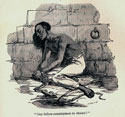
Expostulation
 In this period of Whittier's career, one that was to last three decades, he wrote more prose than poetry. Both were polemical. Although the poetry of this period was not among his best, poems such as “Expostulation” were very influential when distributed in broadsides. The poem begins with a long quotation from Dr. Charles Follen, a German patriot, who had come to America for the freedom which was denied to him in his native land and allied himself with the abolitionists. It’s followed by a quotation from a speech by Samuel J. May, before the poem begins. When May, speaking in a Boston church in 1830 had referred to negroes in a sermon on Prejudice, the minister of the church told him that he would never be allowed in that pulpit again. (Woodwell 37)
In this period of Whittier's career, one that was to last three decades, he wrote more prose than poetry. Both were polemical. Although the poetry of this period was not among his best, poems such as “Expostulation” were very influential when distributed in broadsides. The poem begins with a long quotation from Dr. Charles Follen, a German patriot, who had come to America for the freedom which was denied to him in his native land and allied himself with the abolitionists. It’s followed by a quotation from a speech by Samuel J. May, before the poem begins. When May, speaking in a Boston church in 1830 had referred to negroes in a sermon on Prejudice, the minister of the church told him that he would never be allowed in that pulpit again. (Woodwell 37)
“Genius of Amerca! Spirit of our free institution!—where art thou? How art thou fallen, O Lucifer! Son of morning,--how art thou fallen from Heaven! Hell from beneath is moved for thee, to meet thee at thy coming! The kings of the earth cry out to thee. Aha! Aha! Art thou become like unto us? Samuel J. May
Our fellow-countrymen in chains!
Slaves-- in a land of light and law!
Slaves--crouching on the very plains
Where rolled the storm of Freedom's war!"
Whittier then makes several allusions to the Revolutionary War, fought for freedom on the same soil, and continues to describe the horror:
What ho! Our countrymen in chains!
The whip on woman’s shrinking flesh!
Our soil yet reddening with the stains
Caught from her scourging, warm and fresh!
What! Mothers from their children riven!
What! God’s own image bought and sold!
Americans to market driven,
And bartered as the brute for gold!Speak! Shall their agony of prayer
Come thrilling to our hearts in vain?
To us whose fathers scorned to bear
The paltry menace of a chain;
To us, whose boast is loud and long
Of holy Liberty and Light;
Say, shall these writhing slaves of Wrong
Plead vainly for their plundered Right?
Whittier follows this with six stanzas of allusions to foreign revolutions in which American have sympathized with the enslaved and oppressed, and to other countries that have abolished slavery. He then urges his readers:
Up, then, in Freedom’s manly part,
***
From graybeard eld to fiery youth,
And on the nation’s naked heart
Scatter the living coals of Truth!Oh! Rouse ye, ere the storm comes forth,
***
The gathered wrath of God and manHear ye no warnings in the air?
Feel ye no earthquake underneath?
But Whittier is a Pacifist
Rise now for Freedom! Not in strife
Like that your sterner fathers saw,
The awful waste of human life,
The glory and the guilt of war:
But break the chain, the yoke remove,
And smite to earth Oppression’s rod,
With those mild arms of Truth and Love,
Made mighty through the living God!
Full text of "Expostulation"
Next poem >
